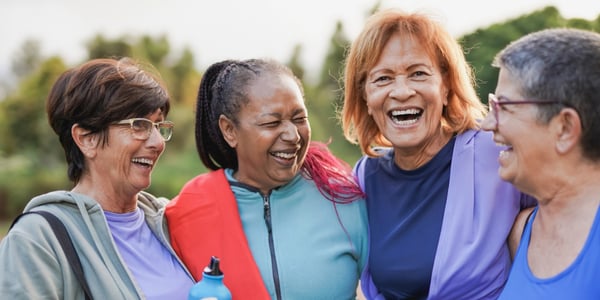As we pass the milestone of 50, many of us begin to wonder how well we're aging. Aging is an...
Age-old Myths: Challenging the Stereotypes About Aging
Myth #3: Aging automatically leads to poor health and a decline in physical and mental abilities.
Truth: This myth is deeply rooted in our cultural beliefs and often reinforced by media portrayals of older adults as frail and dependent. However, research has consistently shown that aging does not automatically lead to poor health or a decline in physical and mental abilities. While some age-related changes are inevitable, the extent and rate of these changes can vary significantly among individuals. Many older adults maintain good health and continue to engage in activities that require physical and mental abilities.
Furthermore, advances in medicine and technology have greatly improved the health and well-being of older adults. For example, medical treatments and interventions can help to prevent or manage age-related diseases, and assistive technologies can help to maintain physical and mental abilities. Additionally, healthy lifestyle choices, such as regular exercise, a balanced diet, and social engagement, can help maintain good health and cognitive function.
Therefore, it is important to recognize that aging does not automatically lead to poor health and a decline in abilities and that older adults can continue to lead fulfilling and active lives.
Myth #4: Memory loss is a normal part of aging and cannot be improved.
Truth: One common myth about aging is that memory loss is an inevitable part of the aging process and that it cannot be improved or prevented. However, this is not necessarily true. While some age-related changes, such as a decline in certain brain functions, can affect memory, memory loss is not inevitable. Furthermore, memory can often be improved or prevented.
For example, research has shown that certain lifestyle choices, such as regular exercise, a balanced diet, and social engagement, can help to maintain cognitive function and prevent memory loss. Additionally, cognitive training and other interventions can help improve memory and other cognitive abilities. Furthermore, medical treatments, such as medication or surgery, can also help to manage or treat conditions that can cause memory loss.
Therefore, it is important to recognize that memory loss is not a normal part of aging and can often be improved or prevented. It is also important to seek medical advice if you or a loved one is experiencing memory loss, as this may be a sign of an underlying condition.
Myth #5: Older people are not as productive or valuable as younger individuals in the workforce.
Truth: This myth perpetuates the stereotype that older workers are less productive or valuable than younger workers. However, this is simply not true. While some age-related changes may affect certain abilities, older workers can continue to be productive and valuable in the workforce. In fact, many older workers have a wealth of knowledge, experience, and expertise that can be invaluable in various settings.
Additionally, older workers often have other qualities, such as reliability, work ethic, and commitment, that can be valuable in the workforce. Furthermore, many older workers continue to learn, adapt, and excel in their careers and can contribute significantly to their organizations. Therefore, it is important to recognize that older workers are not necessarily less productive or valuable than younger workers and that they can continue to make valuable contributions to the workforce.
Myth #6: Aging is a process that should be feared and avoided.
Truth: This myth is pervasive in our society, with many people viewing aging as something to be feared and avoided. This belief is often fueled by negative stereotypes and media portrayals of older adults as dependent and vulnerable. However, aging is a normal and natural part of life, and it should not be feared or avoided.
In fact, aging can be a time of growth and development, with many older adults continuing to lead fulfilling and active lives. Aging can also bring opportunities for new experiences, learning, and personal growth. Furthermore, embracing and celebrating the aging process can help to combat ageism and promote positive attitudes towards aging. Therefore, it is important to recognize that aging is not something to be feared or avoided and that it can be a time of growth and fulfillment.
Myth #7: Older people are not capable of adapting to change or technology.
Truth: This myth perpetuates the stereotype that older individuals are somehow less capable of adapting to change or technology than younger individuals. However, this is simply not true. While some age-related changes may affect certain abilities, older individuals can continue to learn, adapt, and excel in a variety of domains. In fact, many older adults are skilled at adapting to change and technology and can continue to use and learn about new technologies throughout their lives.
Additionally, older adults often have a wealth of knowledge, experience, and expertise that can help them to adapt to change and technology. Furthermore, many older adults are interested in learning new things and trying new experiences, including learning about and using new technologies. Therefore, it is important to recognize that older people are not necessarily less capable of adapting to change and technology and that they can continue to learn and adapt throughout their lives.
To combat these myths and promote positive attitudes towards aging, it is important to recognize and challenge them and support older adults to live healthy, fulfilling, and active lives. This can involve providing access to medical care, assistive technologies, and social support, as well as promoting healthy lifestyle choices. Additionally, promoting intergenerational connections and collaborations, and celebrating the contributions and achievements of older adults, can help to combat ageism and discrimination and create a more inclusive and age-friendly society. By doing so, we can create a society that values and respects the aging process and older adults and promotes the well-being and dignity of older adults.





